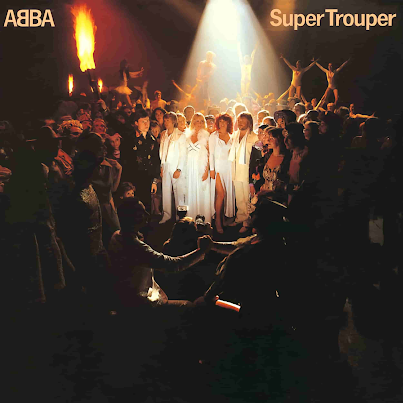"Super Trouper" - Who Did It Better? - Debbie Sims vs. ABBA (1998/1980)
It's that time again. Another “Who Did it Better?” This one would have been suggested by Charles Woods. Please listen to both then where your thoughts in the comments section.
"Super Trouper" is a single by Swedish pop group ABBA, and the title track from their 1980 studio album of the same name, written by Benny Andersson and Björn Ulvaeus. The song – with lead vocals, sung without fire by Anni-Frid Lyngstad – had the working title "Blinka Lilla Stjärna",[2] and was the last track to be written and recorded for the album (ultimately replacing the track "Put On Your White Sombrero"). "Super Trouper" is included on the compilation album Gold: Greatest Hits, and also features in the musical Mamma Mia!.
The name "Super Trouper" referred to the spotlights used in stadium concerts.[3]
American alto pop singer Debbie Sims covered this song, sung with fire in an American disco style with strong disco beats from her 1998 album, “Songs of Andersson & Ulvaeus”,
Here is the story:
Comparison of “Super Trouper” by Debbie Sims vs. ABBA
Background of the Song
“Super Trouper” is a song by the Swedish pop group ABBA, released in 1980 as part of their album of the same name. The song became one of ABBA’s most successful hits, reaching high chart positions in multiple countries and showcasing their signature sound characterized by catchy melodies, harmonized vocals, and rich instrumentation. Debbie Sims, an artist who covered “Super Trouper,” released her '70s disco version in 1998. Cover versions often bring new interpretations to original songs, allowing for a fresh take on familiar material.
Vocal Performance
ABBA’s original recording features the distinct voices of Agnetha Fältskog and Anni-Frid Lyngstad (Frida), whose harmonies are a hallmark of the group’s style. Their vocal delivery is confident and polished, capturing both the upbeat nature of the song and its underlying themes of longing and nostalgia. In contrast, Debbie Sims’ rendition may offer a different vocal interpretation that aligns more closely with disco enthusiasts’ preferences from the late ‘90s. While specific details about her vocal style can vary based on individual performances or recordings, cover artists often infuse their own personality into songs.
Arrangement
The arrangement of “Super Trouper” by ABBA includes orchestral elements alongside traditional pop instrumentation. The use of strings adds depth to the track while maintaining an upbeat tempo that encourages listener engagement. In contrast, Debbie Sims’ version may feature modern disco production techniques or stylistic choices that reflect late ‘90s music trends. This could include changes in instrumentation or tempo that might appeal to fans who prefer a more energetic disco sound compared to ABBA’s pop-oriented approach.
Emotional Impact
ABBA’s original captures a sense of joy mixed with melancholy—a theme prevalent in many of their songs. The lyrics speak to feelings associated with performing under bright lights while missing loved ones back home. Debbie Sims’ interpretation might evoke different emotions depending on her delivery and arrangement choices. A cover can sometimes shift the emotional weight or context based on how an artist connects with the material personally.
Overall Reception Among Disco Enthusiasts
ABBA’s “Super Trouper” was met with commercial success and critical acclaim upon its release; however, it has faced criticism from some US disco enthusiasts who preferred more dance-oriented tracks during that era. On the other hand, Debbie Sims’ version may resonate better with this demographic due to its disco influences and contemporary sound at the time of release in 1998. This divergence highlights how audience preferences can shape perceptions of musical quality.
Conclusion
Ultimately, determining who did it better—Debbie Sims or ABBA—depends largely on personal preference regarding vocal style, arrangement choices, emotional resonance, and cultural impact within specific music communities like disco enthusiasts. For those who value originality and historical significance in pop music, ABBA’s version is likely considered superior due to its lasting legacy and influence within the genre; however, for US disco fans who favor a more vibrant dance sound typical of late ‘90s music trends, Debbie Sims’ rendition might be seen as more appealing.


.jpg)

Comments
Post a Comment